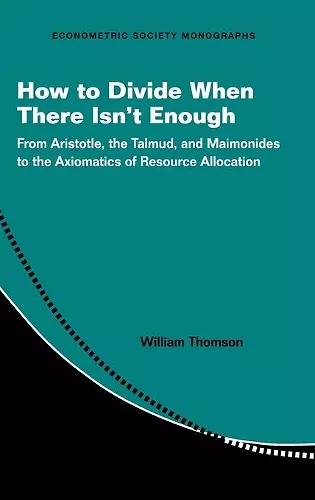How to Divide When There Isn't Enough
From Aristotle, the Talmud, and Maimonides to the Axiomatics of Resource Allocation
Format:Hardback
Publisher:Cambridge University Press
Published:5th Sep '19
Currently unavailable, and unfortunately no date known when it will be back
This hardback is available in another edition too:
- Paperback£49.99(9781316646441)

An introduction to the modern theory of economic design, it develops an up-to-date treatment of the adjudication of conflicting claims.
An introduction to the modern theory of economic design, this book develops an up-to-date treatment of the adjudication of conflicting claims. In addition to covering all aspects of claims problems, it links claims problems with other economic literatures, most prominently the game theory literature.How to Divide When There Isn't Enough develops a rigorous yet accessible presentation of the state-of-the-art for the adjudication of conflicting claims and the theory of taxation. It covers all aspects one may wish to know about claims problems: the most important rules, the most important axioms, and how these two sets are related. More generally, it also serves as an introduction to the modern theory of economic design, which in the last twenty years has revolutionized many areas of economics, generating a wide range of applicable allocations rules that have improved people's lives in many ways. In developing the theory, the book employs a variety of techniques that will appeal to both experts and non-experts. Compiling decades of research into a single framework, William Thomson provides numerous applications that will open a large number of avenues for future research.
'William Thomson, one of the greatest academic advisors in economics worldwide, and a leading scholar in the field of resource allocation, has been carefully developing this project for more than two decades. I believe the book will be considered a classic right after being published.' Juan D. Moreno-Ternero, Universidad Pablo de Olavide, Spain
'The design of rationing rules has inspired for nearly forty years a fascinating intellectual edifice of axiomatic postulates and mathematical results, reviewed here by the premiere author of that literature. Readers will recognize, or discover, William Thomson's superb pedagogical talent in a text that is comprehensive, self-contained, and luminously clear.' Hervé Moulin, Donald J. Robertson Chair of Economics, University of Glasgow
'The folksy title notwithstanding, this is an impressive study of modern economic design. The focus of the book is how best to adjudicate claims on a resource when the sum of those claims exceeds the amount or value of the resource. Thomson (Univ. of Rochester) displays his masterful command of the subject, of which he is certainly a prime architect … The book's lessons apply to many real-world problems, among them bankruptcy claims, estate division, allocation of water rights, allocation of shares of the global carbon budget, and assignment of telecommunications frequencies … Thomson intends the book, and the work it summarizes, to provide a conceptual basis that will inform wise/smart societal choices going forward.' K. J. Murphy, Choice
'… this book is, simply, a masterpiece. It is highly recommended for the broad audience of mainstream economists and a must read for those interested in normative economics …' Juan D. Moreno-Ternero, Social Choice and Welfare
ISBN: 9781107194625
Dimensions: 235mm x 156mm x 30mm
Weight: 840g
504 pages